Brewing a Neo-Liberal Empire: Intoxicated Masculinity, Anarcho-Capitalism and Pink-Washing in Brewdog's 'Business for Punks'
A long-form essay originally delivered at the 2019 Drinking Studies' Liquid Modernities conference in Bournemouth.
This week's edition of this newsletter is a little different to last week's entries. Rather than a new hot take on the events in beer over the last week (of which, frankly, there are already too many to name), this week I am publishing a paper I delivered to the 2019 Drinking Studies' Liquid Modernities conference in Bournemouth. The paper was written during my time as a postgraduate student, mostly during quiet periods during late-night shifts at the library and finally edited with a failing biro on the train to Bournemouth itself.
Although it had very little to do with my then academic research interests, the paper represents my own belief that beer is not only an entirely apt subject for cultural criticism, but also that such criticism can come in many different forms; from online articles and twitter threads to slightly obscure academic conferences. By publishing the paper here, I hope to —at least in part — demystify the academy as a site of knowledge production and simultaneously present one of the things of which I am proud in the last few years, namely getting a paper accepted and delivered to an academic conference where I got to claim that Punk IPA was capitalist realism in packaged liquid form...
In the essay, I examine the Scottish brewery, Brewdog and in particular the words and actions of CEO, James Watt's trajectories as representatives of the way in which many brewers and breweries within the craft beer industry, and its so-called revolution act not only as the very same corporate entities within late capitalism that they claim to be fighting against, but as specific celebrants of a version of intoxicated masculinity rooted in the histories of imperialist individualism and both contemporary iterations and more recent corresponding reiterations of gendered industrial production and leisure roles.
From their modest beginnings in a Fraserburgh garage to their status now as a global craft beerhemoth, Brewdog's own particular brand of brash, intoxicated masculinity has continually driven the multinational brewing company towards a vision of competitive, global market dominance. In this essay, I argue that Brewdog's contradictory actions and statements are necessarily situated within the dual spheres of overtly masculinized 'Craft' culture, including its commodification of revolutionary language and status, as well as the overall network of globalization’s financial capitalist relations.
Though by no means unique, I choose to focus on Brewdog, both as a marketed brand, and as a corporation for two reasons. Firstly, such critique recognizes their obvious success both in and outside of the industry as competitive capitalist actors conjoined with their operation within an industry specifically designated as masculine, and extant within wider patriarchal relations. I argue that such success is in part due to the ubiquity and notoriety of their particular 'postmodern' presence, itself simultaneously complicit in the production of, and encouraged as a reproductive force of many of the same, modern capitalist, neo-imperialist systems and economies which they themselves claim to stand against. Secondly, I believe that in critiquing Brewdog in particular, we might better gain understanding of the particularly gendered territoriality and spatiality of the realms of current craft beer production and consumption. In so doing, I aim to expose more clearly the multifarious problems contained within the inherently gendered dynamics of this movement and industry.
At this juncture, it is thus important to recognize the limitations of this particular essay, and stress that such critical invective should demonstrate that, rather than lambasting Brewdog as a roguish 'lone wolf' in a zythophilic wilderness, they serve merely as a more well known archetypal corporate agent within both the industry and wider logic of late modernity, whose actions neatly incorporate a broad range of these issues. Brewdog are thus at once a visible pillar and 'pioneer' of the industry, as well as a specific subject for analysis, full to the brim with tropes of what I term here as 'intoxicated masculinity'.
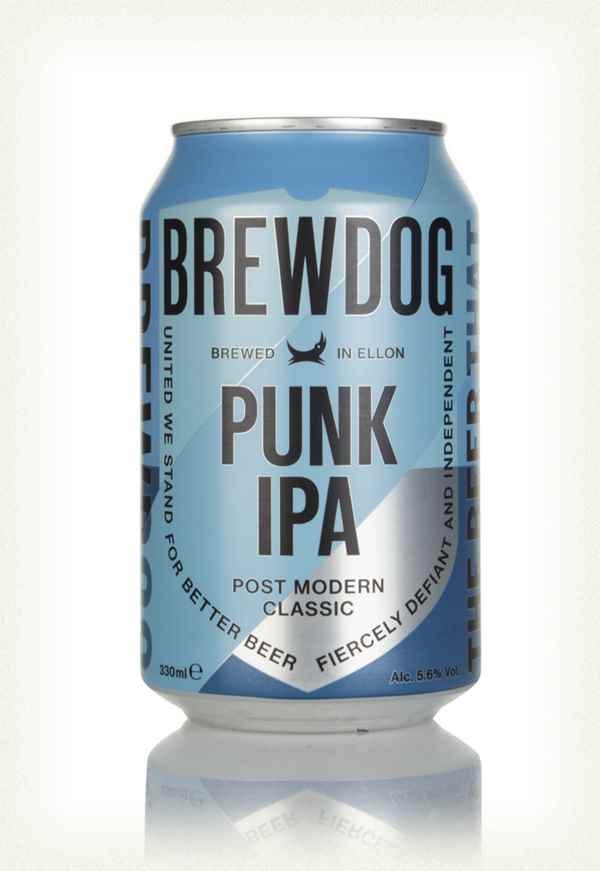
I begin by grounding such critique of Brewdog and much of craft beer within the logic of late capitalist modernity. Such logic is visibly encapsulated in Brewdog's proud boasts of its own core Punk IPA; a 'post modern classic'; a beer brewed with imperially perceived 'New World' hops; and 'the beer that began a revolution'. I argue then that Punk IPA in particular, is the embodiment of Brewdog's own existence within late modernity, or as Fredric Jameson would argue the ‘cultural logic of late capitalism’ in packaged liquid form. It is the fusion of the complete and utter commodification of the dominant anglophonic West's countercultural movement in the 70s, Punk, and the revival of the India Pale Ale, a beer style whose history and historiography are inextricable from the continued legacies of the racialized and gendered violence of British imperialism and settler colonialism. Punk IPA, as an extension of Brewdog then is perhaps the perfect example of what Mark Fisher describes as capitalist realism.
Through it, modernism as both a cultural movement and ideology is not just rejected, but rather cast as an extinct relic, upon whose past, new capitalist empires - and Brewdog's beer 'revolution' - are built and established. In its purportedly postmodern state, Punk IPA exists as the fluid logic of capitalist realism's self-aware, yet uncritical revelling in the commoditization of 'pastiche and revivalism'. As Fisher stated,
Capitalist realism no longer stages… [a] confrontation with modernism. On the contrary, it takes the vanquishing of modernism for granted: modernism is now something that can periodically return, but only as a frozen aesthetic style, never as an ideal for living.
It could be argued concurrently, that Punk IPA and Brewdog themselves, as actor-logicians within this capitalist realism, steeped in individualism and the privatization of responsibility, are also the logical realisation of what we meet under today - Zygmunt Bauman's 'liquid modernity'.
Such liquid modernity, as Bauman reminds us, is often reliant on an individualism that casts blame and 'responsibility for failure [as] falling primarily on the individual's shoulders'.
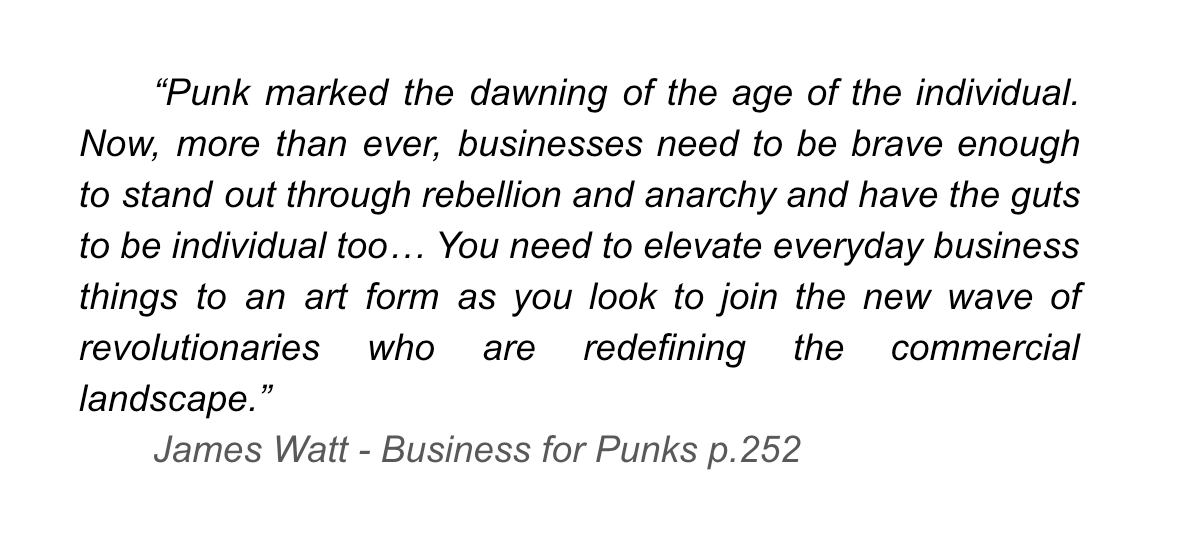
This veneration of the individual, which Watt celebrates with particular fervour as a businessman and commercial actor, encapsulates the company's anarcho-capitalist ethos. He calls on his readers and would-be entrepreneurs to disrupt the market, or liven it up, creating art that can and must necessarily be converted into a commodity for profit. As one pseudonymous cultural commentator, Swanchita Haze observes in an eviscerating review of Brewdog on Disrupt:
The craft beer revolution, like the punk revolution that came before, has been out of the DIY-let's-make-a-living stage since the 70s. It's a well-funded, corporate pursuit, with multiple organisations and investors using careful, polished marketing strategies to generate profit and growth. It also commodifies an appealing aesthetic and attitude to make products that will sell to people seeking out authenticity in a world of fakes and fogeys. Both of these movements co-opted the language and socialist-leaning, ethical sheen of an artistic movement, filtered it through some white guys in tweed caps, and delivered final products as rich and life affirming as Razorlight, the Kaiser Chiefs, and Speedball IPA.
This acknowledgment of capitalist agents and corporations such as Brewdog co-option of 'the language and socialist-leaning, ethical sheen of...artistic movements', which is repackaged in appealing aesthetics and countercultural attitudes diagnoses the interests of capitalism and bigger business inherent to the commodification of such cultural movements and their related tastes or flavours. Moreover, that Haze comically recognizes the gendered and racialized aspects of these commodifiers - the 'white guys in tweed caps' - implicates the wider structures and behaviours of an industry that is often keen to establish its authenticity through particular mythologies and conceited aestheticization reliant on somewhat parochial models of masculinity. Being such a 'revolutionary' is thus defined not only by an invocation of bravery, but a comparative; 'brave enough'. As is highlighted later, this thrill-seeking bravado is rooted in a significantly gendered masculinity rooted in supposed biological maleness, testosterone, and more specifically the phallus: Watt instructs his readers and wannabe anarcho-capitalist punks to 'Grow some teeth and balls. You need to take risks. You need to do some crazy shit.'
Beyond such obvious motifs of audacious masculinity, the particular models of Brewdog's own authenticity are, like so many other of craft beer's origin stories, rooted in particular mythologizations of revolutionary craftsmanship and laborious masculinity, which often attempt to hide actors who, as J Nikol Beckham highlights are more often than not 'white men of significant means and privilege [...who push...] aspects of white-collar managerialism, neoliberal self-actualization, and an ethic of justificatory risk to an illogical extreme and [find] success.' Similarly, Jeff Rice has noted that such origin stories and claims to revolutionary action are in fact a staple trend within the industry, following in the vein of William Morris and the arts and crafts movement. Authenticity then, becomes and is guaranteed through its being crafted, and thus marketed, as a project of unalienated labour. The emphasis then is continually placed on genuine passion for, and of products produced, as a rejection of supposedly ultra-capitalist relations, and through the nominal empowerment this grants to consumers who previously were disempowered.
Chris Land, Neil Sutherland and Scott Taylor, also point to the specific utilisation of 'Craft' as a moniker and ethos under which Brewdog operates, situating both their own practices and physical production within a specifically masculinized realm of work:
'Craft' functions as a crucial signifier here, harking back to a pre-industrial, artisanal logic structured around craft as both skilful practice and passionate engagement (Sennett 2008). The promise is of an authentic and distinctive product, created by people who are genuinely 'passionate about craft beer', rather than just the corporate bottom line.
Inherent to this craft production then, is a double decoction of not only the fetishisation of physical work, itself represented in the aesthetic, uniform and celebration of masculine manual labourers and their modes of production, but also the claims to a masculinized politics of anti-capitalism, in which such production has been built from the ground up by two hard-working men for the benefit of product as both produced and consumed object. Such mythologization of the role of men, whose racial and gender positions are caught within the antagonisms between white masculine managerialism and also those coded as white, working class labourers, is in part accounted for within the discourses of alienation under modernism. The constructed conflict then, is between actors like James Watt and Martin Dickie who like others before them, appeal to the conflicts which, as Beckham reminds us, were inherent to 'the reorganization of labor…[and] the coordinated application of mechanization and managerialism [which] resulted in the de-skilling and alienation of workers'.

In such acts of anti-corporate ethics and 'oppositional rhetoric', the motif of David vs. Goliath is employed ad infinitum. As both Rice and Chris Land, Neil Sutherland and Scott Taylor have pointed to, craft brewers continually position themselves as the 'underdog' in this situation. They are always the 'small upstarts motivated by a love of beer, not money, who are not afraid to offend and are out to transform the industry.'
Ultimately, and as perhaps is so typical of Brewdog and James Watt's own capitalist realism logic contained within 'Business for punks' is the imagery of such enmity and opposition between artisanal, craft and macro, non-craft producers is continually masculinized. So, craft beer as a gendered mode of production is constituted not only through acts which designate the spatiality of the workplace as one also intended for masculinized leisure pursuits, as demonstrated by the bowling alley in the brewery - but also often the deployment of outwardly militaristic destruction.
In Watt's own words, Brewdog have proudly used the following acts of destruction as marketing spin:
• Smashing bottles of industrial beers with golf clubs.
• Blowing cans of generic insipid lager to pieces with sawn-off shotguns.
• Playing baseball with bottles of mass-market beer.
• Blowing bland beer to smithereens with massive fireworks.
• Playing ten-pin bowling with bottles of commodity beer as skittles.
• Putting TNT into kegs of generic beers and exploding them.
As demonstrated in the majority of Brewdog's marketing videos, and as pointed to in 'Bottling Gender', by Nathaniel G. Chapman, Megan Nanney, J. Slade Lellock and Julie Mikles Schluterman, craft beer as both object and topography of production and consumption, remains a predominantly masculine space. Through these acts, craft beer's territorialities remain a zone of and for masculine war-games, in which a penchant for daring, violence and bellicosity - 'blowing shit up' and the enjoyment of this bellicosity's rewards — namely drinking — are enacted in a controlled, leisurely, and masculine space. Indeed, despite the visibly growing presence of consumers and producers within craft beer spaces who are women, as well as those whose gender and sexuality fall outside of either the binary or hegemonic gender positions, occupying traditionally feminized roles, the language and acts listed above suggest that the power dynamics involved in craft beer remain specifically gendered in favour of various performances of hegemonic, white masculinity, into which those whose identities are non-masculine in particular, and even those whose bodies are not assigned, or those who do not identify with masculine gender identities become assimilated through their being considered to accomplish masculinity or variants of it within such spaces.
As well as these ostentatious acts of violence — in terms of their offerings of potential insurrection dissident action or challenges to current political or cultural hegemonies then — Brewdog, like other figureheads in the industry, participate and reproduce a broadly decontextualized, depoliticized and individualist approach indebted more to neoliberal economics, the reproduction of globalized empires, and the rhetoric of consumer empowerment through their own masculinized, craft-industrial agency, rather than any real pursuit of global revolutionary change or challenge to current hegemony.

Indeed, despite claiming to be against the stuffiness of bureaucracy and poking fun at 'greedy hustlers… fat cats... investment bankers... [and] venture capitalists', Brewdog's own history seems to court the agents of financialism more often than it rejects them. In fact, Watt even celebrates such capitalist and financial validation in typically sexualised fashion; 'As soon as you’ve made it, banks will be all over you like love-struck groupies.' Their opposition to these forces; parachuting beer-packed cats over the city of London’s financial district, or parking a howitzer outside the Bank of England, is less an act of defiance and more a specifically marketizable pastiche of dissent.
Such courting of globalization and financialism is most obviously demonstrated in Brewdog’s own volte-face in regards to its acceptance of a 22% stake by investment bankers and venture capitalist portfolio holders, TSG Partners in 2017. Such collaboration in fact corroborates the truth behind Brewdog and others in the industry like them, who have cynically deplored buy-outs or other financialized corporate investment, only to later turn to them — craft beer production and its producers' success is eventually measured through the homosocial acceptance of liberal capitalism as 'the end of history', embracing the interests of hyper corporate financial capitalism and its lucrative investment capital.
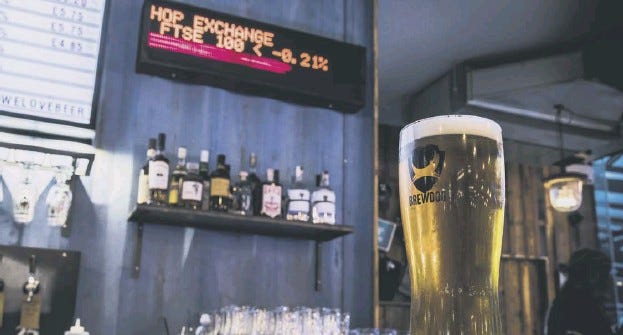
This embrace is made clear through such acts as the Hop Exchange line in Brewdog’s Canary Wharf site, where the cost of a drink fluctuates with the FTSE 100, epitomizing the celebration of risk which such financial actors continually undertake. Such wilful oblivion of the history of the 2008 crisis expresses a callous, ahistorical disdain for the resulting austerity inflicted upon — and at the expense of — the marginalized by globalization’s financialized, debt capital market economy. So much for revolution.
Further, I argue that entrepreneurialism of this particular ilk, because it holds risky behaviour in high esteem, is in many ways the logical endpoint of the masculinist individualism within capitalist realism, for as we are reminded by J Nikol Beckham,
the entrepreneur is thought to be self-motivated, competitive, autonomous, bold, energetic, creative, productive, innovative, and above all antibureaucratic.
The celebration of these masculine actors and in particular of men who ‘risk it all’ to prove a point in the face of inimical bureaucracy and red-tape's adversity is woven into the particular narrative of Brewdog. In Business for Punks, the action of Watt and his company are projected as a driving force, tied to Watt and Brewdog’s own performance of risky and dangerous behaviour.
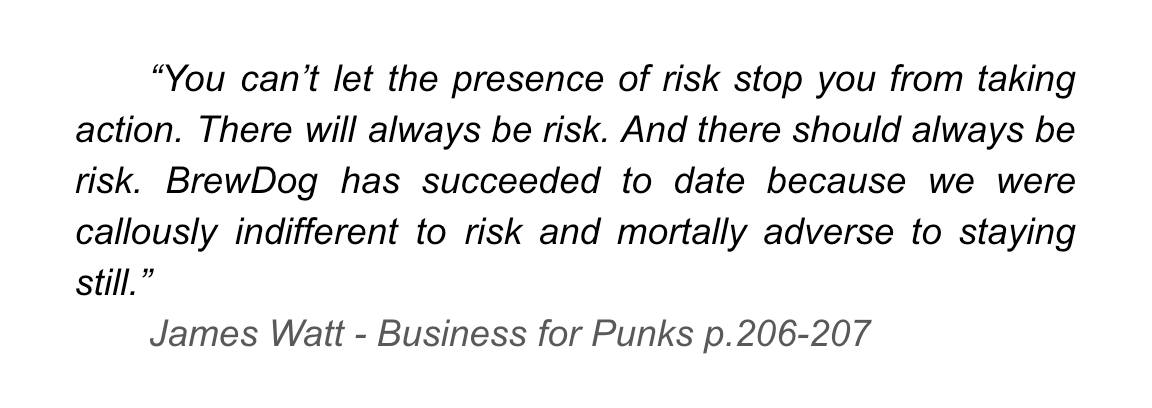
From sea-captain to craft brewery owner, the story is rooted in the performance of a frontiersman-like masculinity. This frontiersmanship and neo-imperialist pioneering finds itself at the forefront of modern imperialism's crusade, establishing bars and breweries of cultural imperialism across the world as part of the beer 'empire' which Brewdog aims to build. That Watt, as Brewdog's white European captain should build his first American site in Columbus, Ohio may in fact be the only indeliberate and cruel irony ever lost on the company.
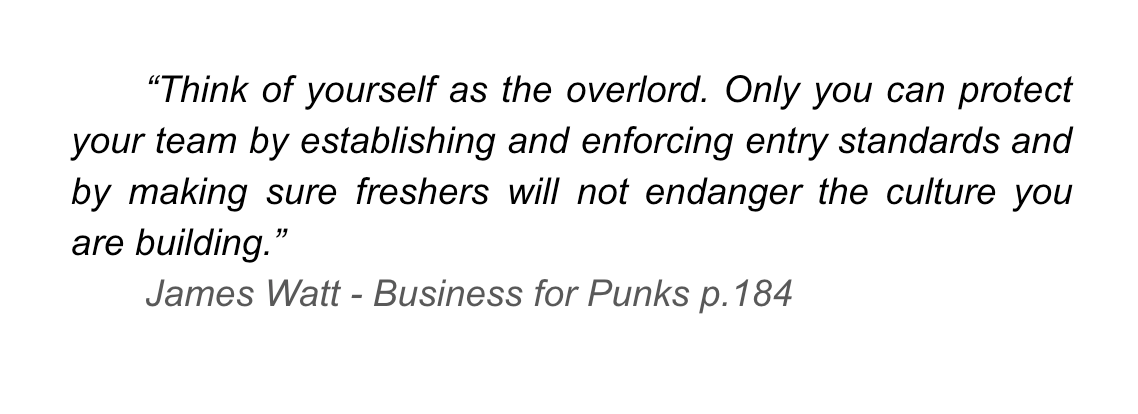
This captaincy, corporate despotism and understanding of particularly masculinized leadership roles underlines a point which lies again within the distinct cult of the post-imperial, individual actor, and the power that such individuals can wield as 'overlords'. Indeed, despite continually praising the efforts of the whole Brewdog team, at AGMs and in much of their own marketing videos, the two owner-founders and majority stakeholders, James Watt and Martin Dickie continually appear as the conspicuous driving force of Brewdog’s success; a neat distillation of thrift, more representative of a resurgent, Thatcherite work rationale than any communal DIY spirit or collaborative undertaking. Indeed, Brewdog's recently instituted Unicorn fund, through which the company gives away 20% of its profits - 10% to charity, and 10% as reward to its workers, emblematizes similarly neo-Victorian preferences for private philanthropic efforts enabled by the 'embourgeoisiement [of]...personal economic dependence' as a means of wealth distribution, rather than perhaps far more radical societal restructuring. Such philanthropy, Florence Sutcliffe-Braithwaite has argued were a founding ideological element in Thatcher’s moralized financial policies.
Lastly, it is through such philanthropic acts, and often in combination with its commoditized, marketized celebration of marginalized 'underdog' groups that I believe Brewdog particular practices reify liquid modernity. 'Hello My Name is Vladimir', a beer that was 'not for gays' and in which Brewdog's parody of the Russian President’s recent entrenchment of the nation state through reaffirmation of Russian Orthodox Christianity’s homophobia, bore all the hallmarks of the same masculinity which it attempted to ridicule through the production of russophobia and pop-art. Similarly, beers such as ‘No Label’, in which Brewdog outsourced to a PR firm to advertise the opening of their Soho bar, with a view to ‘celebrating its diversity and inclusivity’ while not mentioning the words 'Lesbian', 'Gay', 'Bisexual', 'Trans' or 'Queer' or liberation anywhere, exemplify the typical actions of neoliberalism’s economic homonormativization. Thus, queer people, rather than those whose demands for equality and liberation should be met, are merely treated as the newest customer demographic to be assimilated into production and consumption.
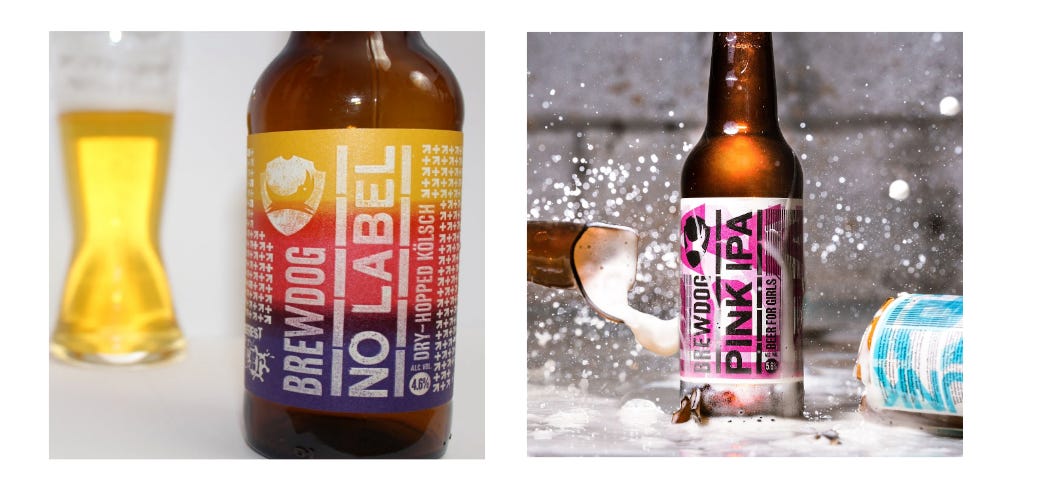
Indeed, the backlash received in the face of the marketing of a beer which fundamentally misunderstood trans people’s experience, reducing them to a poorly analogized, dehumanizing hermaphroditic plant void of agency and complete with a particularly denigrating biological essentialism, which 'eschewed labels' just like Kölsch beers, themselves a specific and obviously delineated category of brewing styles was ignored. Instead, responding to such allegations in Business Insider, Watt doubled down:
I think it was… important to make a beer that tastes fantastic but also messed about with unusual hops that have gone through this kind of gender change and in a style which is a Kolsch, which is somewhere in between an ale and a lager. The whole thing just blurs the boundaries of identity.
Reaction to, or rather the lack of apology in the face of strong critical feedback on beers such as 'Trashy Blonde' and more recently, Pink IPA reinforce the particular logics of Brewdog's postmodern, capitalist realism and liquid modernity. Brewdog, through their continual commoditization of anti-capitalist slogans, ideals and aesthetics become empowered to encroach on liberatory, revolutionary groups' ideological epithets and clout while abandoning the underlying principles. Equally, the veneration of the individual who claim to recognize or practice fallibility creates an atmosphere in which individuals empowered by their relation to others through wealth and or their corporate position thus become entirely unaccountable. The ignorance and dismissal of criticism by concerned parties time and time again demonstrate not only Brewdog's commitment to the pursuit of their own financial survival and growth, but to deliberately evoking reaction for reaction’s sake. As I myself have written elsewhere, such actions are 'impoverished, simplistic and arguably deliberately cynical ploy[s] reliant on consumerism itself, and necessarily related to the acts of purchase and consumption', reinforcing Brewdog's image as a force resolutely adversarial to the reportedly prevailing cultural trends, no matter to whom overall damage is done.

In conclusion, as has been illustrated, Brewdog's intoxicated masculinity operates through targeted deployment of specifically masculine-coded imagery and consciously masculinized rhetoric, both of which are filtered through the hazy lens of a purported postmodernism better understood as the logical realisation of Mark Fisher's capitalist realism. The role of masculinity's role in the expansionism of Brewdog's growing, globalized bar empire is inseparable from its commoditization of countercultural movements and the expression of late capitalism's neoliberal hailing of individualism.
At the same time, this self-styled craft individualism, also expressed by other almost exclusively white masculine figures as the dominant industrial narrative, authenticates itself through the celebration of the mythology of masculine risk taker-entrepreneurs, contributing to a narrative which eventually celebrates and welcomes the collaboration with the interests of globalization and financialization ahead of the consumers, workers and the wider economy it once claimed to champion.
The specific reverence with which masculinized spheres of production and consumption are treated, in which the performance of masculinity as the accomplishment of leisure and violence in equal measure, enables a particularly virulent form of consumerism, rooted in masculinity and capital's mutual desire to maintain their hegemonic positions through subsumption and assimilation of ideologies, practices and action into their logic. As Bauman noted, 'consumerism... links consumption to self-expression, and to notions of taste and discrimination. The individual expresses himself or herself through their possessions.'Thus, the expression of such intoxicated masculinity, is one in which those who accomplish such gendered feats are intoxicated in and by masculinity — in James Watt’s own words — 'stumbling, punch-drunk from one potential financial oblivion to the next.'
If you have enjoyed this essay and for more writing like it, please do share or subscribe.



